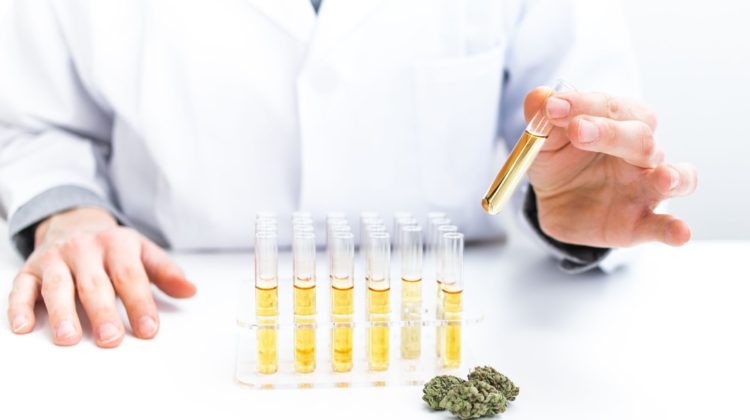
Several studies reveal that compounds in cannabis can prevent COVID-19. Photo credit: nokturn.
A recent study published by the Journal of Natural Products shows that hemp compounds have the ability to prevent and treat COVID-19 infections.
The study has gained attention across the internet, even catching the attention of Jimmy Kimmel, late night talk show host.
“All this time we’ve been listening to the CDC, we should have been eating CBD,” Kimmel said during his show this week.
However, this does not mean simply smoking weed will protect people from contracting COVID-19.
The study, Cannabinoids Block Cellular Entry of SARS-CoV-2 and the Emerging Variants, was led by Dr. Richard van Breemen, professor of medicinal chemistry at Oregon State University.
Van Breemen and colleagues discovered that cannabidiolic acid (CBDA) and cannabigerolic acid (CBGA) are effective at inhibiting the spike proteins found in COVID-19 from infecting human cells.
How Does it Work?
This study focuses on the utilization of cannabis’ antiviral compounds.
COVID-19 comprises of six structural proteins. These proteins include spike, envelope, membrane, nucleocapsid, hemagglutinin esterase and helicase. All of these proteins are potential drug targets. Drug targets are any crucial element of a virus’s replication or infection process that can be inhibited.
The spike protein is the target for COVID-19 vaccines as well as CBDA and CBGA.
COVID-19 Spike proteins bind to the ACE2 receptor found in human cells, which causes infection. Antibodies developed through COVID-19 vaccination attack these spike proteins to prevent infections, according to a study published in January of 2021.
The study found that a mixture of CBDA, CBGA and THCA is most effective at binding to the spike proteins in COVID-19. When this compound binds to the spike protein, it inhibits the virus from binding with the ACE2 receptor; and therefore prevents infection and replication.
Individuals can take these compounds — which researchers derived from hemp, orally through a dietary supplement — Van Breemen said in an interview with Vice.
Smoking Cannabis Won’t Provide the Same Benefits
While oral administration may be effective, smoking hemp or cannabis may not be the best way to reap cannabis’ antiviral benefits.
The cannabinoids which researchers used in this study are unstable when heated. They convert and decompose when combusted, so the treatment would be most effective when someone takes it orally rather than inhaling the compounds.
In an interview with Vice, Van Breemen stated that the treatment would be most effective after an individual knows that they were exposed to COVID-19. The treatment can also be effective for those with a confirmed mild to moderate COVID-19 infection, but not for those hospitalized with severe infections.
These cannabinoids were derived from hemp, a cannabis plant that has 0.3% or less concentration of THC. Therefore, this treatment does not produce psychoactive effects. However, the compounds are in THC-rich cannabis as well.
The study examined the efficacy of the compounds against variants alpha and beta in a controlled lab setting. Researchers have yet to test them on humans in clinical trials.
Completing adequate research in a timely manner for this study may prove to be difficult due to federal regulations.
Van Breemen said the compound is extremely safe. But, he added, researchers will need to conduct more testing in clinical trials to determine the efficacy of the compounds.
The research team was not able to test THC alone during this study due to university and federal regulations because of its status as a controlled substance.
Other Studies With Similar Findings
While this study has gained a lot of attention, it is not the first to suggest that compounds in cannabis fight COVID-19.
Eybna, a terpene manufacturer, conducted a study regarding the use of compounds in cannabis plants to combat COVID-19.
Eybna achieved similar results as Van Breemen and his team using different components of hemp.
The company’s researchers created a terpene formula called NT-VRL which has both antiviral and anti-inflammatory properties. Terpenes determine the scent of plants.
This study focused on combating cytokine storms that can occur in the body during an immune response. A cytokine storm occurs when the body produces too many cytokines.
Cytokines are molecules that aid in communication between cells to create immune responses. Inflammation is a common immune response to any viral infection.
Results show that the combination of Eybna’s NT-VRL formula and CBD effectively reduces cytokine storms. More specifically, it reduces inflammation that causes the body to produce cytokines.
The study also shows that when combined with CBD, NT-VRL also has antiviral properties.
Another study from the University of Chicago also suggests that CBD inhibits COVID-19 infection. The study was released this month.
It suggests that CBD and its metabolite 7-OH-CBD can stop COVID-19 from replicating in lung epithelial cells.
These results come from the testing of human lung cells and mice in a laboratory setting.
Researchers also examined the medical records of patients using CBD for seizure conditions. Results revealed that the rate of COVID-19 infections was significantly lower in patients who used CBD versus those who did not. As Vice reports, “only 4.9 percent of people taking CBD became infected with COVID-19, compared to 9 percent [among those who did not take CBD.”
While these studies appear promising, additional research is needed in order to put these treatments into practice.



It is NOT binary:: suck on a bud of CBD flower to get the CBDa and suck on a bud of CBG flower to get the CBGa; then add medicinal THC and medicinal CBN as natural anti-coagulants; then add polycultures of medicinal THC/CBD/CBG to prevent a cytokine storm and to protect those with the comorbidiities of cancer, diabetes, hypertension, and COPD 🙂 It is NOT binary it is polycultural 🙂